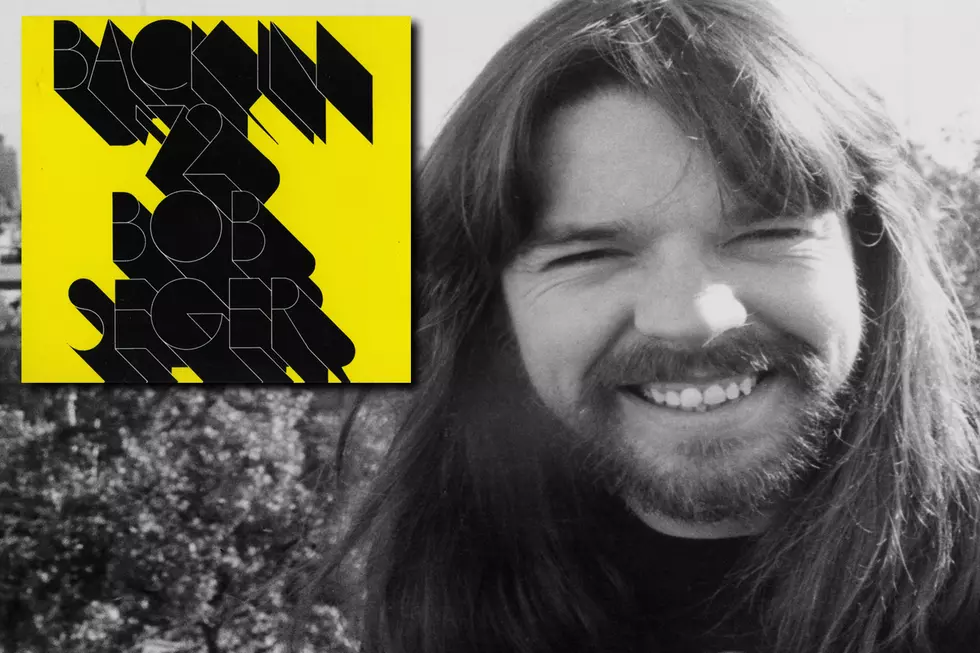
50 Years Ago: Bob Seger Digs Deep on Underrated ‘Back in ’72’
Bob Seger is closely associated with the music of Detroit, one of the great R&B centers in the U.S., but he was actually obsessed with the soul sounds of the Deep South. They filtered up from radio stations like Nashville's WLAC-AM, whose signal could and often did reach Seger and his friends in Michigan.
He "preferred the Stax-Volt and Southern stuff to the repetitive Motown 'cement beat' in the '60s, though I know Motown had some great musicians," Seger told Musician in 1980. "But me and my friends, like [Detroit buddy and future Eagles founder] Glenn Frey would send away for these singles, and then it was like, 'Listen to this one. … Let this one pin your ears back.'"
Seger was particularly enamored with the Muscle Shoals Sound Studio in northwest Alabama, which produced records by the likes of Arthur Alexander, Wilson Pickett, Clarence Carter, Etta James, and Aretha Franklin, among others. He wasn't alone: By 1972, the Rolling Stones had cut pieces of their Sticky Fingers album at Muscle Shoals. Boz Scaggs recorded his classic solo debut there, with Duane Allman on guitar.
In the ensuing years, Rod Stewart would put his Atlantic Crossing album to tape at the studio, and Paul Simon completed some of his biggest early hits there, as both hoped some of that Southern mojo would rub off on them.
Seger and his manager Edward "Punch" Andrews followed them to Muscle Shoals, looking for the same magic for his next record. Released in January 1973, Back in '72 was to feature collaborations with the studio's famed session musicians under the direction of Atlantic Records staff producers Dave Crawford and Brad Shapiro. Unfortunately, a misunderstanding about financial matters scuttled the pair's involvement with Seger almost immediately.
Listen to Bob Seger Perform 'I've Been Workin''
He told Musician that Crawford and Shapiro "told Punch, 'We'll cut him for $1,500 a side.'" Seger and Andrews thought that meant $1,500 per album side, and they jumped right in. "We cut Van Morrison's 'I've Been Working' and two others the first day and I was sky-high," Seger recalled, "working with [session drummer] Roger Hawkins, [keyboardist] Barry Becket and all these guys who cut with Aretha and everything.
"That night, though," he added, "Punch came into my hotel room and said, 'They want $1,500 a tune, not per album side,' and he had to tell 'em to forget it. I ended up doing the rest of the album pretty much alone with the Muscle Shoals guys, and I thought again, 'File these guys names away for future reference because they're something else.'"
Seger eventually moved sessions for the album back to Detroit, and in the process connected with several musicians he would continue to work with for years. One of them was the late saxophone player Alto Reed, then going by his given name, Tommy Cartmell. Reed would become one of the foundations of Seger's Silver Bullet Band, touring and recording with him for the next four decades.
A saxophone is the first thing heard on the most famous cut on Back in '72, the studio recording of "Turn the Page." (The song was made famous after its release on Seger's breakthrough Live Bullet concert recording in 1976.) The original version has a slightly different lilt in the chorus, and a few different lyrics here and there, but is otherwise intact. The scene Seger describes is one many a long-haired rock band or their roadies can recall from their own experiences.
"I wrote 'Turn the Page' in 1971," Seger told Goldmine in 2007. "The night before we'd been harassed at a truck stop in Wisconsin at two in the morning by some salesmen who kept calling us 'girls,' because we had long hair. So we left because we didn't want to get into a fight and become some police report."
Listen to Bob Seger's Studio Version of 'Turn the Page'
Seger said he was "thinking about how these people hate you because of how you look and how unreasonable it is. That became part of it, but the bigger thing I think was the real weariness of the road – and I tried to capture that. I think I captured it for truck drivers. I think I captured it for traveling businessmen, and I think I just captured it for people who have to travel a lot and just plain miss home or family, or both."
Listeners fortunate enough to hear "Turn the Page" in 1973 (or later, in 1976) were likely to understand the story Seger was telling, thanks in no small part to his affecting vocal performance, and the capable backing of the musicians on the song. One prominent writer who did not – Creem's then-editor and Detroit native Dave Marsh – called out Seger for the "mawkish moans like 'Turn the Page,' which (for all its good lines, and capable vocal) is finally just another mewling piece of rock star self-pity."
Marsh found more complimentary things to say about another Back in '72 track, "Rosalie," a Stonesy paean to Detroit deejay Rosalie Trombley, whose radio show on CKLW-AM broke a number of area artists in the '60s and '70s – including Seger. "'Rosalie' is the kind of personal yet universal song we need more of," Marsh wrote in Creem.
Trombley could be troublesome to artists if she didn't like their music, a circumstance Seger alludes to in the song's lyrics: She's quite the mediator, a smoother operator you will never see. She'll see you later, and no one dares disobey her openly. Whether he "disobeyed" Trombley at some point remains an open question, but one thing is for certain. She did not put "Rosalie" into heavy rotation on CKLW.
"This time, Rosalie didn't come through," Marsh wrote for Rolling Stone in 1978. "She backed off the record, fearing charges of conflict of interest."
Listen to Bob Seger Perform 'Rosalie'
Fortunately for Seger, Thin Lizzy heard the tune and covered it – once on their 1975 studio album Fighting, and again on the classic Live and Dangerous in 1978. The concert version was released as a single and became a Top 20 hit in the UK.
Seger also added a brace of cover tunes to Back in '72. He plays with the pace and melody of the Allman Brothers Band's "Midnight Rider" to start the album, shifting the song's center of gravity from acoustic blues to amped-up Southern shuffle. It's a remarkable move, though it might take listeners a few plays to get the original out of their heads and accept Seger's take for what it is. Likewise, fans of Van Morrison's "I've Been Workin'" might need a breath after hearing Seger bearing down, hard, on his own version.
Each rendition of the song finds a soul-music aficionado hard at work, with his best weapons at his command – Morrison with his rapier and Seger with a heavy club. Both achieve the same end – slaying the listener, properly and definitively.
Two of the most extraordinary tracks on Back in '72 are Seger originals – the ballads "So I Wrote You a Song" and the album-closing "I've Got Time." Though Seger would have no issue with writing and performing slow tunes later in his career ("We've Got Tonite," "Shame on the Moon," and "Like a Rock" are among his biggest hits), the spirit of Back in '72 – its energy, really – comes from the loud, driving hard rock/R&B that takes up most of the record. These two songs (along with the aforementioned "Turn the Page") also hit hard, each with a different approach, and different strengths.
"I've Got Time" follows a man who "was raised, raised and taught to hurry … been hurrying, worrying all my days." He finds love by the chorus and decides to slow down. This decision point is punctuated by the languid pace of the music: It flows slowly, its moments elongated, stretched for biggest effect.
Listen to Bob Seger Perform 'So I Wrote You a Song'
"So I Wrote You a Song," though, is a towering thing. Seger's voice peaks at regular intervals throughout, as he explains in his singing what he is apparently unable to say in conversation. There are other elements that contribute to the tension – key modulations into and out of the choruses, an angelic mass of background vocals, guitars that both cradle the melody and solo above it. Then the last line comes in as a repetition of the song's title, and Seger takes it up to the heavens and holds it there. It makes one wonder, once again, how something this objectively awesome could escape the attention of a wide audience.
The answer to that might be, because Bob Seger hates it. Really hates it. Not just the one song, but the whole of Back in '72.
"As far as bums go, I'll go back to my early stuff," he told Goldmine, listing a couple specific songs from his earliest work. "Oh my god, I hope nobody ever hears them. … There's a bunch of songs on Back in '72 that are bums. People keep saying, 'I want to hear that album' and I go, 'No, that's okay.'"
He's serious about it, too. Back in '72 never been reissued on vinyl or compact disc, nor is it among the selection of albums he has made available to streaming services. There are solid arguments – both financial and aesthetic – for Seger to reissue his way-back catalog. (Former music executive Tim Quirk made an extensive plea on National Public Radio in 2017.) But thus far, Seger has rebuffed them all.
Punch Andrews, still serving as Seger's manager, was quoted in Quirk's piece as saying artists' minuscule compensation for streaming plays are still a big issue and one of the main reasons Seger held out on making any of his music available to streaming sites for years. That's fair enough – artists earn a pittance for each play of their songs, and that's not fair – but Seger's argument seems to be that the records are not available simply because he doesn't like his performances. He calls out Back in '72 specifically for derision.
All due respect, but it's a shame this lost classic is unavailable for legal consumption online, or physical play offline. Perhaps one day Seger will reconsider, and Back in '72 will finally be given its due.

